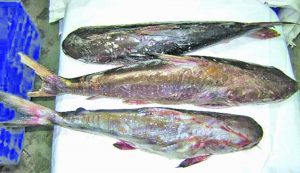…as impasse projected to cost economy US$1.2M annually
Minister of Agriculture, Noel Holder, was on Tuesday questioned about what Government has been doing to secure a lifting of the ban on exportation of catfish to the United States (US).
In budget 2019, some $14.7 million was set aside for the Caribbean Regional Fisheries Mechanism as part of Guyana’s contribution to international organisations.
In light of this allocation, Opposition Chief Whip Gail Texieira questioned whether Guyana could get help from this very organisation, to which Holder replied in the affirmative. She then questioned what Government is doing about the matter, to which the Minister said that negotiations with the US are ongoing.
which the Minister said that negotiations with the US are ongoing.
According to Holder, however, these negotiations are largely being done by the Public Health Ministry. As such, Holder admitted he is not entirely up to date with where the matter is.
At this point, Opposition Chief Whip Gail Texieira inquired whether legislation is being drafted to help Guyana become compliant.
“We’re trying to fix the regulations,” Holder said. “The US has a kind of ban on catfish coming in to the US. They are saying that the catfish must be caught live and transported to a processing plant, live. And there processed to be sent to the US.”
“Now we can’t do that. Our stuff is caught in the ocean, degutted, put on ice and brought in. We can’t carry it live to a processing plant. But the US doesn’t want to hamper places like ours. They, apparently, were trying to keep out to protect their internal agencies. So they’ve been working with us to ensure we can continue doing what can be done to make this thing work.”
Holder added that he has personally been working with the outgoing US Ambassador Perry Holloway and he was optimistic that he has been making headway. Holder noted that the fishing industry represents approximately US$70 to $80 million annually to Guyana, with the ban on catfish costing the country US$1.2 million.
The ban by the US Department of Agriculture (USDA) was instituted against Guyana earlier this year. Veterinary Public Health Unit Director, Dr Ozaye Dodson had said the imposition from the US export market was just a temporary technical barrier to trade.
He had posited that the country fell short of the US standards in three areas: first, on the issue of the presence of inspectors; secondly, there was insufficient documentation detailing verification of each step in the sanitation and Hazard Analysis and Critical Control Points (HACCP) process and thirdly, there was insufficient documentation specifying how the industry manages adulterated catfish products.
However, Opposition Leader Dr Bharrat Jagdeo had called out the incumbent Administration for not doing enough to address the concerns of the fishing industry with the ban. Jagdeo had said that he is “of the firm view that the coalition Government is fully responsible for the plight of local fishermen, given that they were notified of the USA’s pending changes to export regulations since November 2015.
The coalition Government, despite having received notice of these changes, failed to communicate effectively with the stakeholders of the fisheries sector, many of whom have invested heavily in this area.”
“To make matters worse, the Coalition Government received an extension until February 3, 2018, to bring Guyana into compliance with the new export regulations and failed again” the Opposition leader had said.
 which the Minister said that negotiations with the US are ongoing.
which the Minister said that negotiations with the US are ongoing.